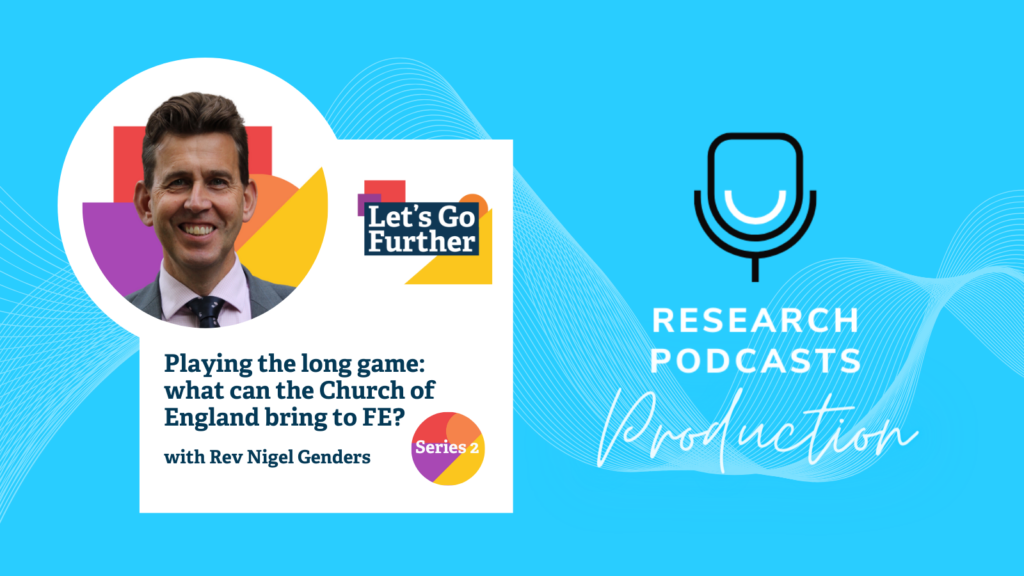
“Playing the long game: what can the Church of England bring to FE?”, Let’s Go Further Podcast, Ep 8, Series 2
In Episode 8 of Let’s Go Further Joe Mcloughlin talks to Reverend Nigel Genders, the Church of England’s Chief Education Officer and Chief Executive of the National Society.
The pair begin by outlining the history and the scope of the church’s ties to education which date back to Christianity beginnings in (what is now) Britain in 597 AD, through to the formation of the National Society in 1811, and the 1944 Education Act. Nigel sees the establishment of the National Society (which he now leads) as a significant turning point for the Church of England’s role in education as it became a movement for mass education of the poor and disadvantaged in a way that had not been seen before. Today some 4,800 CofE schools educate over 1 million children.
Nigel then outlines the vision of the Church for education which focuses on the common good. For Nigel this translates to an ethos of community within schools and an emphasis on helping children realise how they can help better society. A vocational approach to education being central to this philosophy in emphasising the unique God given talents of each individual and empowering them to see how they can help their communities and wider society.
So, every person has unique gifts and abilities and motivations. That’s kind of what is fundamental to our Christian understanding of who we are as human beings. And God calls us as who we are, to be the unique people that we are. That’s fundamentally what vocation is about, as far as I can understand it, you know we’re called to use our gifts in the service of others, we’re called to ensure that, you know, what we do in our lives is paying attention to kind of who we are as individuals
Rev. Nigel Genders
Joe then turns the conversation to further education, highlighting that the majority of CofE schools are primary. Nigel and Joe discuss the difference in approach to further education where the Church’s role is not systemic. Instead, the church plays a more informal role in FE, particularly focusing on Chaplaincy as a space for pastoral support for students. Nigel argues that this comes with pros and cons. On the positive side, the fact that the chaplain is not connected to the academic or formal side of the school give students a space to talk much more freely. However, the informality often mean chaplaincy roles are voluntary and part time which limits the relationship – building that can occur.
To close, Joe and Nigel look to the future of the Church’s role in education. Nigel emphasises the Church’s long-term commitment to education as opposed to the short-term planning of the political cycle, arguing that “it’s much more than 10 years it’s about our commitment to children and young people in this nation for generations to come.”
The Let’s Go Further Podcast is produced by the Skills and Education Group in collaboration with Research Podcasts and is published fortnightly.
Research Podcasts offer podcast consultancy, production and training for researchers and academics. Check out our various training workshops including an introduction to podcasting workshop, how to launch your podcast and our more advanced courses on podcast presenting, podcast editing, and how to build a podcast brand.
Freya Peake, Research and Administration Assistant at Research Podcasts